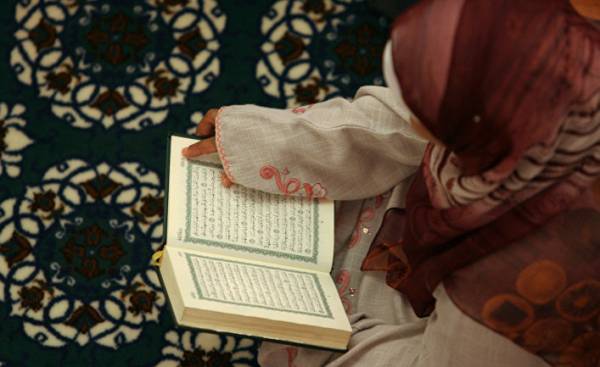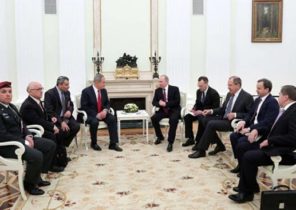
Here you can read a great interview of Raziba Khan, an expert on Egypt Muslim Shadi Hamid. I like this snippet:
As for Christianity, I thought about it from an intellectual standpoint, but not as something real and Mature, in part because in General liberal atmosphere of the city Bryn MAWR, Pennsylvania, is not conducive to outdoor Dating Christians.
I think it affected me, perhaps on a subconscious level, the idea that Christians, whom I knew, usually not too serious about their faith, while at a local mosque became pretty clear that there are Muslims who for their faith very seriously.
I’ve always tried to be careful in talking about it, because they can easily be misinterpreted, but I do remember a couple of years ago one of my friends has described Islam as “the last aggressive religion.” To me this description seemed interesting.
This is the part of Islam, which helps me to be sensitive to the suspicions of some atheists and secularists against the religion of Allah.
(But it also helps me understand why the Muslims themselves, not even especially religious, seem so committed to the idea of an unusually bitter and violent nature of Islam).
Being “conventionally Christian” and realizing that your own faith for whatever reason, cannot compete with the political resonance of Islam, you may have to look for some non-religious ideologies.
That’s why I’m so interested in the rise of trump and the presence in Europe of the far right; it is by and large a secular movement, which, in a sense, respond to Islam and at the same time simulate the feeling of confidence and belief that he instills in his followers.
This is exactly what I respect about Muslims in General: they take their faith much more seriously than we Christians. What is happening among us, it will survive only those forms of Christianity that take seriously the faith and will include it in an ordered way of life. That would mean for Christianity to be “aggressive”? Not filled with violence, instilling fear or violent, but serious and threw himself to the culture of the existing society. That is why, among other things, Orthodoxy is so attractive to men. It poses a very serious problem — the fasting, prayer and so on — and expects that you will cope with them. It is, of course, does not provide for strict rules and morals, but sentimental is not. The Christian life viewed as a pilgrimage to God in which we die to ourselves every day. It is not Moralistic therapeutic deism. This is faith.
Shadi Hamid calls himself a political and cultural liberal. His book “Islamic exceptionalism” was an attempt to explain what is happening in the Muslim world. In a previous interview he talked about the bad habit of citizens of Western countries to accept on faith the statements of Muslims about what they believe and what it means. Here’s another piece of interview of Raziba Khan:
For me the main problem lies in the unwillingness of political scientists to take religion seriously as a cause. In other words, because the majority of scientists of the Academy of Sciences is not particularly religious or not are often among the believers, they tend to see religion is not the cause, and something caused by other, more real material factors, something tangible and measurable. So if someone subscribes to Islamist organizations like the “Muslim Brothers”, this trend will explain that such concepts as rural-urban migration, underemployment, poverty, anger at America and the list goes on. All this, of course, important, but what does the science say about “irrational” things such as the desire to go to heaven? This is just one of many important factors that must be considered.
This becomes obvious when you talk to the Islamists about why they do what they do. They don’t say: “I do it because I want to get to heaven.” This is largely reflected in the fact that you feel and perceive, talking with one of the members of the “Muslim Brothers”. It is important for them is what motivates them, especially when they decide to join the sit-in, knowing that there will be military and will use live ammunition. It is not so much that they want to die, but that they are ready to die, and it scares them not as much as others, because the chance to go to heaven, they believe, is high, especially if they are accidentally killed in the midst of the action committed in the name of God and his message.
Here is another example: last year, after an unsuccessful coup attempt in Turkey, President Erdogan made a statement that caused a lot of issues. He called this attempt a divine gift. What could he mean? Is it possible that he wanted it or was behind his own assassination attempt? No. That, he said, there is nothing strange. Personally have no doubt that Erdogan really think it’s literally God’s gift and addressed to him personally a message.
This brings me to the question of “rationality”. If you believe in such cosmic universe — a universe where people daily witnesses of divine magic, if you will, the most rational appears to be sacrificing something in this life for the next. In the end, we’re talking about eternal heavenly abode.
And it’s for sure: if modern American Christianity and have lost the sense of purpose and meaning, it is largely due to the loss of sensation of the supernatural reality.
And one more thing. I admire the intellectual and moral courage of Hamid is not to bend to the politically correct line against the Islamic faith:
So, in my new book there are definitely some ideas and insights that have not quite satisfied, and the feeling is sometimes a little strange. When the book came out, I was worried, among other things, due to the fact that my arguments, in a sense, evaporated, and voice them I could almost not force. We are witnessing the era of anti-Muslim prejudice, and I resent the idea that I, too, have a hand in this. The problem is that it really is. But at the same time I can’t stand the idea of silence about what I believe and believe to be true just because someone can use this unacceptable from my point of view purposes. For me the alternative is worse, all this nonsense on the topic “Islam — a religion of peace”. To talk about the brutality of Islam is no less absurd, but with this stereotype, at least we don’t fight, pretending that everything is just the opposite.
Read the entire interview. It is worth your time. I’m going to buy the book of Hamid, as the promise of her complex and important.
It’s funny, but I think I have as much or more in common with faithful American Muslim than the modernistic American Christian.
UPDATE: the Reader under the name Firebird writes:
“Your strange bias there. In the West, the Muslims, observe the instructions of Islam, to the religion seriously and oppose themselves to the culture of the existing society. The vast majority of believers and observe all the rituals Muslims are not doing anything counter-cultural. In fact, the opposite is true.
Having lived for some time in most Muslim countries, including that which is especially known for its conservatism, I can’t say that among self-defined Muslims severity is much higher than among who observes all rites of Christians. I have not seen among the average visitors of mosques a greater desire to study Scripture or philosophy compared to the parishioners. Society is not as stable as we are — in terms of secularization by default, so a large part of the population is people attending the mosque.
I see a strong bias of the society to follow religious rules and traditions, some of which is Islam (but not universal). A great example of this is the constant pursuit of de facto caste system that exists in Pakistan, which, though alien to Islamic thought, with her perfectly coexists and thrives in the minds of a huge number of Pakistani Muslims.
To sum up: in the UK and California follow the dogmas of Islam — the statement is really counter-cultural and aggressive. Nothing like much of the Muslim world there. And in the above places the best analogy for compliance with the requirements of Islam would be the position of a liberal Professor at Yale. Predictable and based on deterrence, persuasion, and simple inertia.”
Certainly a fair and accurate assessment.
Rod Dreher is a senior editor of The American Conservative. He wrote articles and worked as an editor at such publications as the New York Post, Dallas Morning News, National Review, South Florida Sun-Sentinel, Washington Times and Baton Rouge Advocate. Comments Kind published in the Wall Street Journal, Commentary, the Weekly Standard, Beliefnet and Real Simple. He has performed on TV NPR, ABC News, CNN, Fox News, MSNBC and BBC. Lives in Saint Francisville, Louisiana, with his wife and three children. Wrote two books, The Little Way of Ruthie Leming and Crunchy Cons.







